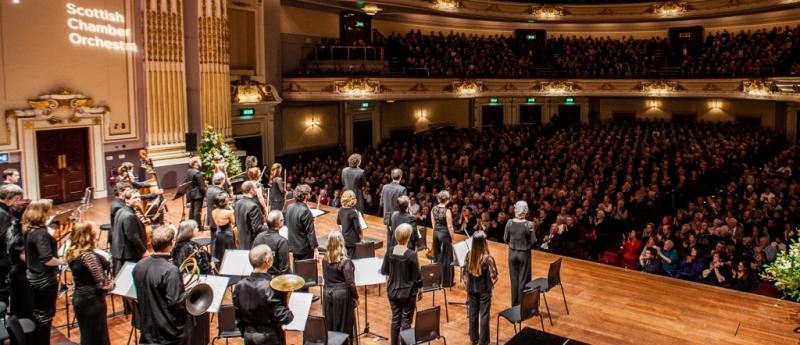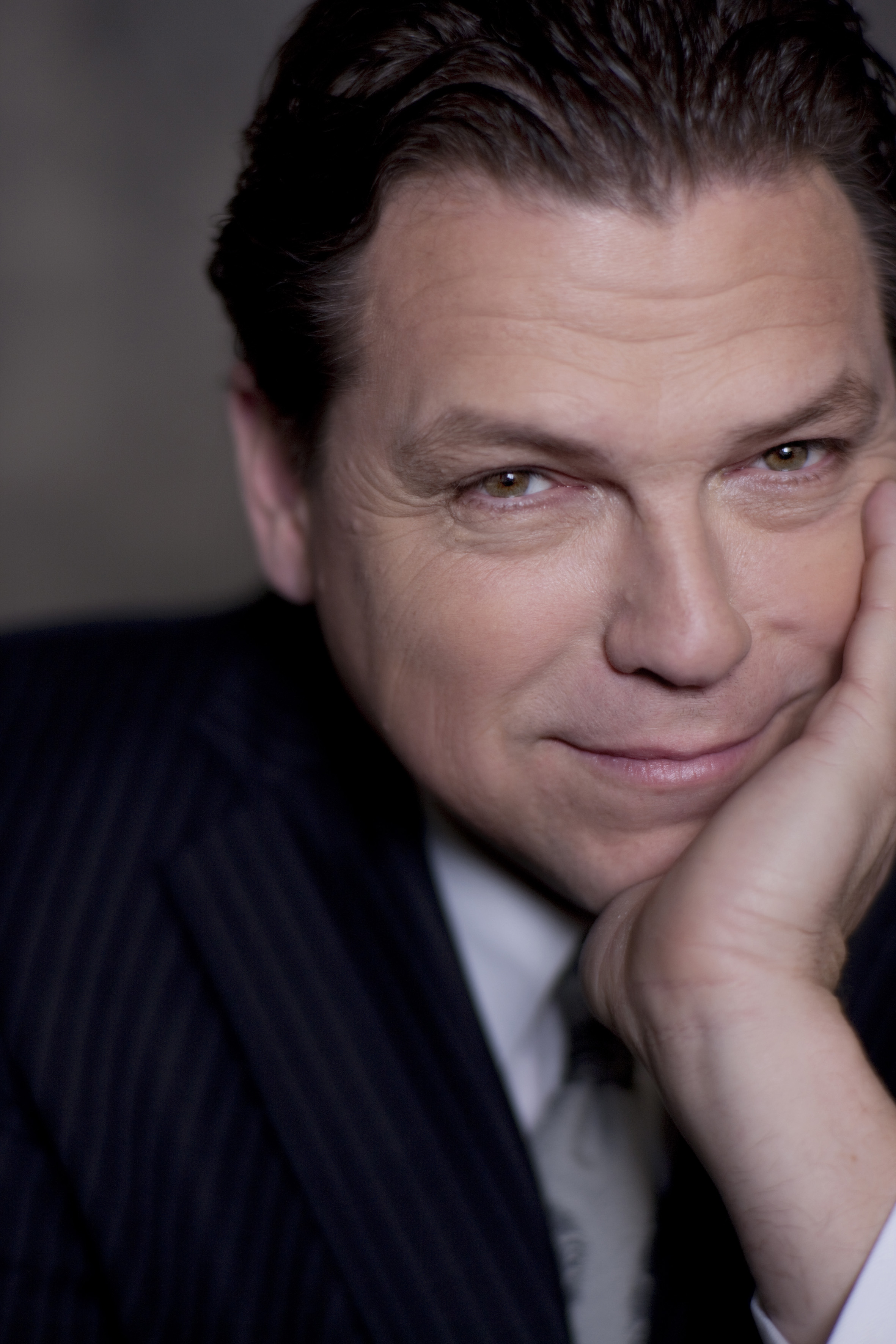Missa Solemnis, SCO, Ticciati, Usher Hall, Edinburgh | reviews, news & interviews
Missa Solemnis, SCO, Ticciati, Usher Hall, Edinburgh
Missa Solemnis, SCO, Ticciati, Usher Hall, Edinburgh
Beethoven proves immune to Ticciati magic

This was a performance laden with contradictions. After last weekend’s gargantuan Grande Messe des Morts, the standard issue Edinburgh Festival Chorus seemed much smaller – but not really small enough. The Scottish Chamber Orchestra was in its augmented format, almost up to symphony orchestra size, but playing in its increasingly popular authentic style with very little vibrato and the crunchy sound of natural brass instruments.
Scottish audiences have become accustomed to the brilliance of the SCO, and in particular the revelatory quality of its playing under its Principal Conductor Robin Ticciati. I don’t have to cast my mind back very far to recall a lithe and joyous account of Haydn’s The Creation (under Harry Christophers) in which this orchestra, soloists, and its own chorus appeared to be cast from the same luminous material. So it comes as rather a disappointment that a prestigious performance in the closing days of the Edinburgh International Festival should prove to be immune to the Ticciati magic.
 Beethoven, of course, did not write easy-listening music for the Missa Solemnis. It is propelled by strong, sometimes dogmatic thematic material peppered with striking dissonances and contrasts of key. The choral writing, in particular, is high and loud, two characteristics that do not show off the Edinburgh Festival Chorus to best advantage. While it can still produce an impressive volume in the big tuttis, it is not a comfortable sound and diction is poor (no 'G' in "Gloria", not a 'Q' to be heard in the "Quoniam"). The quieter moments were good. The tenors did well in the pianissimo "Et incarnatus", but the sopranos were feeble in the "Et vitam venture saeculi" fugue. There was (remarkably for Edinburgh) some noticeable booing from the gods for the chorus curtain call; it makes you wonder what it is that prevents the SCO using its own superb chorus for a work so ideally suited to it.
Beethoven, of course, did not write easy-listening music for the Missa Solemnis. It is propelled by strong, sometimes dogmatic thematic material peppered with striking dissonances and contrasts of key. The choral writing, in particular, is high and loud, two characteristics that do not show off the Edinburgh Festival Chorus to best advantage. While it can still produce an impressive volume in the big tuttis, it is not a comfortable sound and diction is poor (no 'G' in "Gloria", not a 'Q' to be heard in the "Quoniam"). The quieter moments were good. The tenors did well in the pianissimo "Et incarnatus", but the sopranos were feeble in the "Et vitam venture saeculi" fugue. There was (remarkably for Edinburgh) some noticeable booing from the gods for the chorus curtain call; it makes you wonder what it is that prevents the SCO using its own superb chorus for a work so ideally suited to it.
In the struggle to maintain equilibrium between chorus and orchestra, the soloists were left to fend for themselves. The operatic tenor Michael Schade (pictured above left, by Harald Hoffmann) had most to do, and seemed eerily capable of producing a loud, effortlessly high note with his mouth almost closed. He was the most engaged of all the soloists, taking care to watch Ticciati’s beat, moving with the pulse, and generally bringing a sense of performance to his part that was more than just the notes. Soprano Genia Kühmeier was clear in the upper registers but unfocused below, while mezzo Gerhild Romberger came over as rather stately. The bass Georg Zeppenfeld was inconspicuous in the ensemble pieces, though opened up a glorious richness for the short but heartfelt solo at the start of the "Agnus Dei". Had the entire piece matched the quality of sound at this point then we might have been talking about a performance more thrilling than pedestrian.
By convention, critics tend to ignore audience gaffes as an irrelevance, but no one could draw a veil over the fortissimo “Bravo” bellowed a few rows behind me in the stalls as the last note faded. This was so much louder, so much more insistent than the over-eager clapping that occasionally mars festival performances. In a performance whose magical moments were in short supply, even a long silence before the real applause started could not dispel the sense of a moment ruined.
rating
Explore topics
Share this article
Add comment
The future of Arts Journalism
You can stop theartsdesk.com closing!
We urgently need financing to survive. Our fundraising drive has thus far raised £49,000 but we need to reach £100,000 or we will be forced to close. Please contribute here: https://gofund.me/c3f6033d
And if you can forward this information to anyone who might assist, we’d be grateful.

Subscribe to theartsdesk.com
Thank you for continuing to read our work on theartsdesk.com. For unlimited access to every article in its entirety, including our archive of more than 15,000 pieces, we're asking for £5 per month or £40 per year. We feel it's a very good deal, and hope you do too.
To take a subscription now simply click here.
And if you're looking for that extra gift for a friend or family member, why not treat them to a theartsdesk.com gift subscription?
more Classical music
 BBC Proms: Jansen, Royal Concertgebouw Orchestra, Mäkelä review - confirming a phenomenon
Second Prom of a great orchestra and chief conductor in waiting never puts a foot wrong
BBC Proms: Jansen, Royal Concertgebouw Orchestra, Mäkelä review - confirming a phenomenon
Second Prom of a great orchestra and chief conductor in waiting never puts a foot wrong
 BBC Proms: Royal Concertgebouw Orchestra, Mäkelä review - defiantly introverted Mahler 5 gives food for thought
Chief Conductor in Waiting has supple, nuanced chemistry with a great orchestra
BBC Proms: Royal Concertgebouw Orchestra, Mäkelä review - defiantly introverted Mahler 5 gives food for thought
Chief Conductor in Waiting has supple, nuanced chemistry with a great orchestra
 Dunedin Consort, Butt / D’Angelo, Muñoz, Edinburgh International Festival 2025 review - tedious Handel, directionless song recital
Ho-hum 'comic' cantata, and a song recital needing more than a beautiful voice
Dunedin Consort, Butt / D’Angelo, Muñoz, Edinburgh International Festival 2025 review - tedious Handel, directionless song recital
Ho-hum 'comic' cantata, and a song recital needing more than a beautiful voice
 Classical CDs: Dungeons, microtones and psychic distress
This year's big anniversary celebrated with a pair of boxes, plus clarinets, pianos and sacred music
Classical CDs: Dungeons, microtones and psychic distress
This year's big anniversary celebrated with a pair of boxes, plus clarinets, pianos and sacred music
 BBC Proms: Liu, Philharmonia, Rouvali review - fine-tuned Tchaikovsky epic
Sounds perfectly finessed in a colourful cornucopia
BBC Proms: Liu, Philharmonia, Rouvali review - fine-tuned Tchaikovsky epic
Sounds perfectly finessed in a colourful cornucopia
 BBC Proms: Suor Angelica, LSO, Pappano review - earthly passion, heavenly grief
A Sister to remember blesses Puccini's convent tragedy
BBC Proms: Suor Angelica, LSO, Pappano review - earthly passion, heavenly grief
A Sister to remember blesses Puccini's convent tragedy
 BBC Proms: A Mass of Life, BBCSO, Elder review - a subtle guide to Delius's Nietzschean masterpiece
Mark Elder held back from blasting the audience with a wall of sound
BBC Proms: A Mass of Life, BBCSO, Elder review - a subtle guide to Delius's Nietzschean masterpiece
Mark Elder held back from blasting the audience with a wall of sound
 BBC Proms: Le Concert Spirituel, Niquet review - super-sized polyphonic rarities
Monumental works don't quite make for monumental sounds in the Royal Albert Hall
BBC Proms: Le Concert Spirituel, Niquet review - super-sized polyphonic rarities
Monumental works don't quite make for monumental sounds in the Royal Albert Hall
 Frang, Romaniw, Liverman, LSO, Pappano, Edinburgh International Festival 2025 review - sunlight, salt spray, Sea Symphony
Full force of the midday sea in the Usher Hall, thanks to the best captain at the helm
Frang, Romaniw, Liverman, LSO, Pappano, Edinburgh International Festival 2025 review - sunlight, salt spray, Sea Symphony
Full force of the midday sea in the Usher Hall, thanks to the best captain at the helm
 Elschenbroich, Grynyuk / Fibonacci Quartet, Edinburgh International Festival 2025 review - mahogany Brahms and explosive Janáček
String partnerships demonstrate brilliant listening as well as first rate playing
Elschenbroich, Grynyuk / Fibonacci Quartet, Edinburgh International Festival 2025 review - mahogany Brahms and explosive Janáček
String partnerships demonstrate brilliant listening as well as first rate playing
 BBC Proms: Akhmetshina, LPO, Gardner review - liquid luxuries
First-class service on an ocean-going programme
BBC Proms: Akhmetshina, LPO, Gardner review - liquid luxuries
First-class service on an ocean-going programme

Comments
This is an beautifully